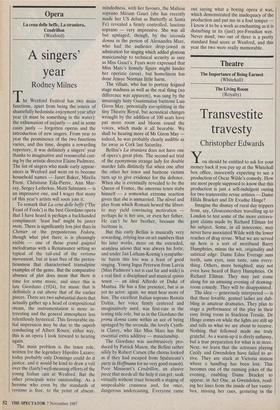Opera
La cena delle beffe, La straniera, Cendrillon (Wexford)
A singers' year
Rodney Milnes
The Wexford Festival has two main functions, apart from being the source of shamefully hedonistic enjoyment year after year (it must be something in the water): the exhumation of unjustly — and in some cases justly — forgotten operas and the introduction of new singers. From year to year the prominence of the two functions varies, and this time, despite a rewarding repertory, it was definitely a singers' year thanks to imaginative and resourceful cast- ing by the artistic director Elaine Padmore. The list of singers who made early appear- ances in Wexford and went on to become household names — Janet Baker, Mirella Freni, Christiane Eda-Pierre, Ann Mur- ray, Sergey Leiferkus, Matti Salminen — is an impressive one, and I wager that many of this year's artists will soon join it.
To remark that La cena delle beffe (The Feast of Fools') is the best Giordano opera that I have heard is perhaps a backhanded compliment: 'least bad' might be juster mots. There is significantly less plot than in Chenier or the preposterous Fedora, though what plot there is is pleasingly risible — one of those grand guignol melodramas with a Renaissance setting so typical of the tail-end of the verismo movement, but at least free of the preten- tiousness that characterised transalpine examples of the genre. But the comparative absence of plot does mean that there is time for some music, and since this is late Giordano (1924), for music that is definitely a cut above that of the earlier pieces. There are two substantial duets that actually gather up a head of compositional steam, the instrumentation is more in- teresting and the general atmosphere less relentlessly hysterical. This favourable ini- tial impression may be due to the superb conducting of Albert Rosen; either way, this is an opera I look forward to hearing again.
The main problem is the tenor role, written for the legendary Hipolito Lazaro; today probably only Domingo could do it justice, and it would be kind to draw a veil over the (fairly) well-meaning efforts of the young Italian cast at Wexford. But the other principals were outstanding. As a heroine who even by the standards of verismo is free, to the point of absent- mindedness, with her favours, the Maltese soprano Miriam Gauci (she has recently made her US debut as Butterfly at Santa Fe) revealed a firmly controlled, luscious soprano — very impressive. She was all but upstaged, though, by the seconda donna in the person of Alessandra Marc, who had the audience drop-jawed in admiration for singing which added glorious musicianship to technical security as sure as Miss Gauci's. Fears were expressed that Miss Marc's homely figure might hinder her operatic career, but homeliness has done Jessye Norman little harm.
The villain, who has to portray feigned stage madness as well as the real thing (no difference was apparent), was sung by the amazingly lusty Guatemalan baritone Luis Giron May, potentially ear-splitting in the tiny Theatre Royal, but acoustical changes wrought by the addition of 100 seats have put more room and bloom round the voices, which made it all bearable. We shall be hearing more of Mr Giron May indeed, he was probably clearly audible as far away as Cork last Saturday.
Bellini's La straniera does not have one of opera's great plots. The second-act trial of the eponymous strange lady for double murder falls distinctly flat when one after the other her tenor and baritone victims turn up to give evidence for the defence. When she is eventually revealed to be the Queen of France, the amorous tenor stabs himself — a somewhat extreme reaction given that she is unmarried. The novel and play from which Romani hewed the libret- to may yield convincing motivation perhaps he is her son, or even her father. He can't be her brother, because the baritone is.
But this early Bellini is musically very rewarding, relying less on set numbers than his later works, more on the extended, seamless arioso that was always his forte, and under Jan Latham-Koenig's sympathe- tic baton this too was a feast of good singing. Young Ingus Peterson from Latvia (Miss Padmore's net is cast far and wide) is a real find: a disciplined and musical spinto tenor — an ideal Alfredo or Duke of Mantua. He has a fine presence, but is as yet no actor: again, we must hear more of him. The excellent Italian soprano Renata Daltin, her voice firmly centered and imaginatively used, was first-rate in the testing title role, but as in the Giordano the prima donna came within an ace of being upstaged by the seconda, the lovely Cynth- ia Clarey, who like Miss Marc has that essential extra additive — musicianship.
The Giordano was unobtrusively pro- duced by Patrick Mason, the Bellini rather sillily by Robert Carsen (the chorus looked as if they had escaped from Spalanzani's party in Hoffmann for no very good reason). Poor Massenet's Cendrillon, an elusive piece that needs all the help it can get, sank virtually without trace beneath a staging of unspeakable crassness and, for once, dangerous undercasting. Everyone came out saying what a boring opera it was, which demonstrated the inadequacy of the production and put me in a foul temper I know it to be a work as enchanting as it is disturbing in its (just) pre-Freudian way. Never mind, two out of three is a pretty standard final score at Wexford, and this year the two were really memorable.


































































 Previous page
Previous page